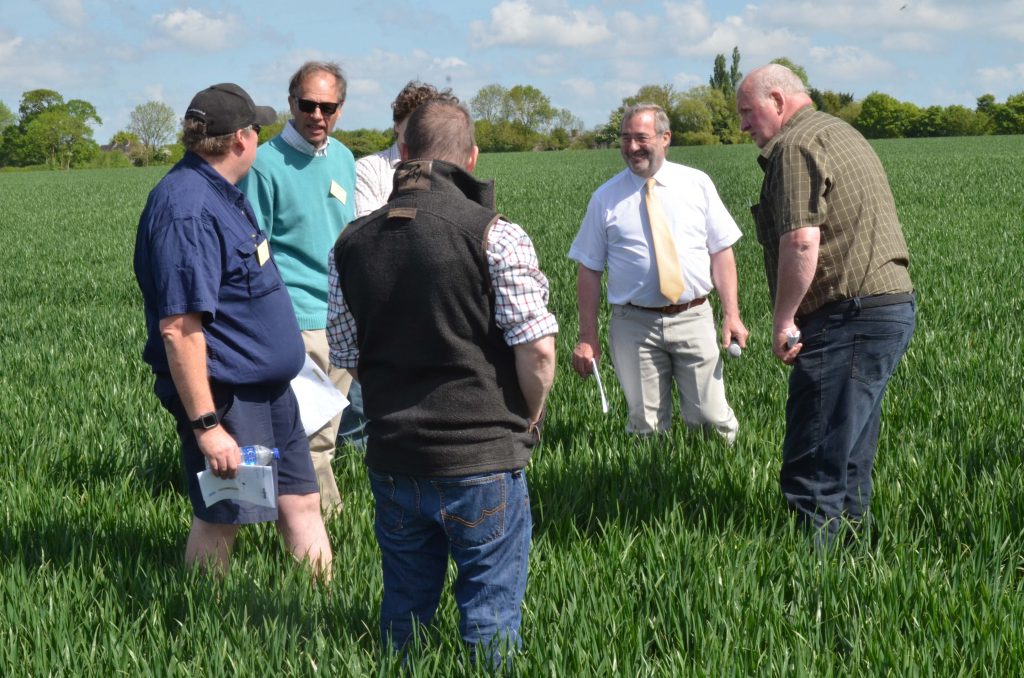Lower establishment cost benefits highlighted at Claydon days
22nd May 2018
Jeff Claydon highlights benefits of the Opti-Till system in the field Reducing ‘per-tonne’ production costs while maintaining or increasing crop yields to maximise revenue must be the Number One priority
Jeff Claydon highlights benefits of the Opti-Till system in the field
Reducing ‘per-tonne’ production costs while maintaining or increasing crop yields to maximise revenue must be the Number One priority for UK farming businesses if they are to survive and thrive in an increasingly uncertain global market environment post-Brexit.
That was the key take-home message for farmers from all over the UK who attended two open days in May hosted by crop establishment specialists Claydon at their factory and farm at Wickhambrook in west Suffolk, where experts highlighted the issues and demonstrated how this can be achieved using the Opti-Till® system.
“Average UK wheat production costs are currently the highest amongst any of our global competitors, including Australia, Canada, France, Germany, Poland and Ukraine. Compared with Russia, which last year produced a record 85-million tonne crop and is now a major exporter, UK production costs are three times higher,” Simon Revell, Export Manager, emphasised.
Figures from the Farm Business Survey show that in 2015 the average cost of producing a tonne of winter wheat in the UK was £143, yet the average sale price was £110-£120/t, so the average grower lost £33-£23 on every tonne sold. Just under 35% produced wheat for £125-£150/t, around 4% had costs of more than £250/t and just 2.5% managed to grow the crop for less than £100/t.
“In 2016, British farms received £3.1 billion in government subsidies, which made up more than half of their overall incomes, yet 26 per cent still failed to break even,” Simon added. “Agricultural commodity prices are more likely to decline due to the forecasted 2018 harvest and the current supply and demand situation, unless there is a weather event, but can we rely on that?
“Input costs are rising, which means that farm incomes are forecast to be lower in real terms, while UK farming businesses face additional threats, ranging from more stringent environmental legislation, changing climate patterns and more frequent extremes of weather. Additionally, there is reduced access to crop-protection products, increasing resistance issues, a shortage of labour and higher costs.
“Against this backdrop it is essential that all farmers review every stage of their operation, something that those in New Zealand were forced to do in 1984. When their cash-strapped government ceased subsidies for the sheep and dairy sector that year it was predicted that 10 per cent of farms would go bankrupt, but they were quick to adapt and 99 per cent survived.
“Farmers were forced to become market aware and produce what customers wanted, while better practices were adopted through necessity, which led to increased efficiency and yields. Since then, the productivity of New Zealand farms has increased by 256%, compared with 137% on UK farms since we joined the Common Market in 1973. Fundamentally, success for UK agriculture post-Brexit will come about by adopting the same approach, namely efficient, market-led production.
“Today, the New Zealand farming industry punches well above its weight, particularly the arable sector. When subsidies finished, arable farmers, like their colleagues in the diary and sheep sectors, realised that they had to become much more efficient by reducing costs, maximising productivity, considering and questioning every aspect of the production process, focusing on attention to detail and becoming more market driven. Doing so has served them well.”
In 2002, wheat prices in the UK fell to levels where it was impossible for even well-managed farming businesses to make a profit using conventional crop establishment techniques. Suffolk farmer Jeff Claydon found himself in just that position and began to develop the Opti-Till® system on his family’s 850-acre arable farm. Over the last 16 years this patented system has been continuously refined to achieve huge time and cost savings.
Using a conventional plough-based system it used to take Jeff 110 minutes to establish one hectare of wheat. When a min-till system was introduced this fell to 42 min/ha, but with Opti-Till® it is just 26 min/ha. The farm now follows a simple three-step process to establish combinable crops: manage stubbles effectively using a 6m Claydon TerraStar and/or 15m Straw Harrow to prepare the land, drill with a 6m Claydon Hybrid, then firm the ground with 12m Cambridge rolls. Adopting this system has greatly improved timeliness and resilience to weather conditions, produced sustainable, higher yields and brought about huge environmental benefits, including the elimination of slug pellets.
“If UK farming businesses can control costs there’s no reason why they cannot compete post-Brexit, but most will have to radically change how they do things,” Jeff emphasised. “In uncertain times, Opti-Till® provides a proven solution which cuts costs, maximises yields and improves profitability, whatever your soil type, wherever you farm.”
Compared with their benchmarking group, E.T. Claydon & Sons’ yields are above average in all three crops grown on the farm, winter wheat, spring beans and spring oats. Wheat yields are 15% above average, while input costs are 20% lower and machinery costs are 19% lower, generating a net farming income before subsidies of £84.66/ha. While the farm is one of the best-performing in the UK, the company that Jeff founded to develop the Opti-Till® system has expanded rapidly and now exports all over the world.

